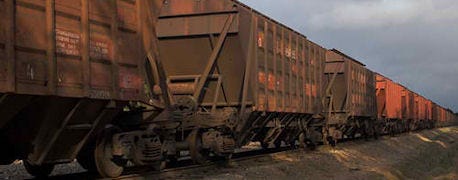
A long-brewing rail car shortage centered on the Dakotas is beginning to lead to trickle-down issues in grain shipping and ethanol industries, South Dakota Gov. Dennis Daugaard said last week, suggesting the railway industry work to find solutions for overflowing grain and ethanol facilities.
In an editorial Friday, Daugaard explained that the shortage is likely caused by several factors, including the extremely cold and long winter, expansion of the Bakken oil field, bigger grain harvests and rail construction in other states.

Surface Transportation Board will hold hearing on rail issue this week
"I am very concerned about this problem because our agriculture economy is highly dependent on the state's commodities getting to the market," he wrote. "Much of what has caused the shortage is out of our control. Still, we must do everything possible to find solutions. Our agricultural producers and shippers need resolution of this situation."
Related: BNSF Grain Trains Are 23 Days Behind Schedule
In response to the issues, the Surface Transportation Board is planning an April 10 hearing to report on recent railroad service questions, review solutions to the issues and discuss additional options to improve service.
Questions on the delays have been shouldered by the two key rail companies shipping out of the area – BNSF and Canadian Pacific. Both BNSF and CP representatives are scheduled to appear at the hearing.
Ethanol impact
Ethanol producers are increasingly concerned with the state of the rail industry. Renewable Fuels Association President Bob Dineen last week in a letter to Ed Hamberger, Association of American Railroads CEO, said the growing disarray in the rail industry within the first quarter of 2014 has caused ethanol producers to scale back production.
On-site storage at producers' locations is a limiting factor, Dineen explained. As rail cars are unable to pick up shipments, ethanol stocks in key regions have been depleted, and prices have increased.
~~~PAGE_BREAK_HERE~~~
"All of this is due to the turmoil on the rails—dislocated railcars and locomotives, increased terminal dwell times, slower train speeds, an insufficient number of crews, and a shortage of spare railcars and locomotives," Dineen wrote.
The production decreases have amounted to 80,000 barrels per day between December, 2013, and March, 2014, Dineen said. He also dismissed the idea that winter weather is the main driver of rail car shortages.
Related: BNSF Promises To Fix Rail Shipping Delays
"The railroads have attributed this lackluster performance and inefficiency to winter weather. But they seem to have forgotten that winter comes every year!" the letter said. "Indeed, a more plausible explanation for the severity of the current epidemic is the explosive growth in railcar shipments of Bakken and Canadian crude oil."
In his letter, Dineen went on to pose several questions to AAR, including a request for more information on when railways expect to recover from the shortage and if slower train speeds will be a "new normal" in light of increased crude oil shipments. A copy of his entire letter can be read on the Renewable Fuels Association website.
Questions from lawmakers
Sen. John Thune, R-S.D., has posed additional questions to CP and BNSF in a Wednesday statement, underscoring a need to improve railway service as farmers move into planting season.
"While the extended winter throughout the region has made it difficult to keep up with the demand from farmers, ethanol producers, and shippers that rely on freight railroads to do business, it is imperative that both railroads do more to address the backlog of rail cars to ensure that shippers can start moving their products to market as we move into planting season," he said.
In response, the rail companies say they have tried to ease congestion and improve service; BNSF recently hired 1,000 more employees, purchased additional locomotives and train cars, and has spent $350 million on track maintenance.
About the Author(s)
You May Also Like




